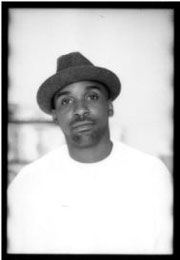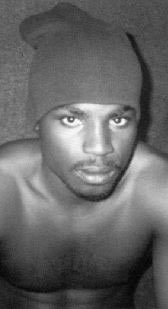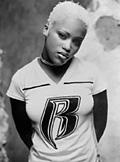Aceyalone was just a scant 15 years old when he composed the following rhyme, which would soon appear as the kickoff to “Cornbread,” the boisterous standout from the Freestyle Fellowship’s second album, Innercity Griots: “Telephone poles, baking hot rolls/A ’91 Pinto sitting on Vogues/bubble gum tick-tock hound dog fleas/Cock-a-doodle doo-doo and some hoghead cheese/Leap out the room, grab the old broom/Eat a watermelon and walk on the moon/Cherry Coke cantaloupe little old maid/A big black berry inside the Kool-Aid/A bass guitar, a old fruit jar/A green canteen and a chocolate bar.”
It’s a non sequitur classic, matching nursery rhyme ease of delivery with a thoroughly intuitive sense of cadence and syllabic interplay. Over a decade later, Acey’s built an impressive career on these protean fragments of rhyme and established himself as one of hip-hop’s most flexible wordsmiths. What Eminem’s doing with flow today, Acey and his Freestyle Fellows—Self-Jupiter, Mikah 9, and P.E.A.C.E.—were pioneering almost a decade ago. Their hip-hop community was a Los Angeles counterculture that existed under the long shadow of the city’s gangster rap scene. To its credit, it’s still extant today, with new legions of MCs and producers for whom the Fellowship is the defining touchstone of their musical evolution.
Such reverence obscures the fact that despite two stunning albums from the early ’90s—To Whom It May Concern and Inner- city Griots—Freestyle Fellowship are virtually unknown to the record-buying public, victims of their own talent. Aceyalone was the only member of the group to release solo projects, and his first two efforts—All Balls Don’t Bounce and A Book of Human Language—have gone just as commercially unrewarded (and, of course, critically lauded) as the Fellowship albums.
On Acey’s most-recognizable single, “Mic Check” (from All Balls), he opened with the arrogant boast, “I start most of my raps off kinda slow/Just so you could see exactly where it gonna go/I make sure your body’s strapped in/’Cause I’m a tailspin and you’re liable to get thrown.” Back when Acey was rapping triple-time with internal rhyme, he could easily brag on how intricate he was. But several years of overachieving for a small cadre of cult listeners has taken its toll on the man who dubs himself “The MC of the Future.”
His new album, Accepted Eclectic, is a much more measured version of Acey’s signature serpentine stylings. His dumbing-down policy is evident from the album’s opening track, “Rappers Rappers Rappers 12 for 10” (which originally appeared on 1999’s Strength Magazine Presents Subtext compilation): “To all you big willie rappers/Silly rappers, my mack milly rappers smoke a Philly rappers/Illy-illy killy-killy rappers, not really rappers/Yah, all you signed rappers, blind to what’s going on behind rappers/Crime rappers, I’m in my prime rappers.”
The song is clearly meant as a lambasting of, well, pretty much everyone else in the game. But with its repetition, it comes off as a whiny screed that smacks more of bitterness than confidence. You can’t blame Acey for being mad, but diluting the science isn’t the answer (even if it’s ironic). The rest of the album is scattered. In some places, he seems way off course, like on “I Got to Have It Too,” a rehash of the Ed O.G. classic, and on “Master Your High,” which is the type of weed track most rappers rely on for lack of better subject matter. But Acey’s never had to lean on the tried-and-true, and elsewhere on the album he oils up his larynx for a true-to-old-form session. “Five Feet” and “Accepted Eclectic” feel like they were penned back when Acey thought he could save the world. The album’s other high point is “Golden Mic,” a convincing rip-off of quick-tongued Southern bounce rhymes, though to hear Acey tell it, the theft is reciprocal, moaning, “Niggas been biting my shit for years.”
Whether he invented double-time rhymes or not, Acey deserves a healthy portion of his arrogance. And in the coming months he’s hoping to parlay his talent into success not only for his solo album, but for albums from a newly reunited Freestyle Fellowship. Jupiter has been released from jail, P.E.A.C.E. has recovered from his car accident, and Mikah has been MCing club nights in L.A.—all of them past their pain and eager to commit testament to wax once again as a unit. As Acey says on “Hardship” from his new album, “I take my pain just like a G.” He’s no gangster, but Acey at least understands there’s wisdom to be gleaned from sorrow and that a true black whirlwind never dies.








